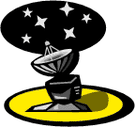History Of The Modern Satellite
Ryan C. / Physics 337 / 16 April 1997

In the history of the world no other invention has revolutionized science
as much as the satellite. As early as 1687 "The theoretical possibility
of establishing an artificial satellite of the earth has been mentioned
by the English mathematician Isaac Newton as a consequence of his work
on the theory of gravitation." (Groliers CDROM) Since that time the work
of scientists all around the world has added to what we now know as the
satellite.
Early Work On Artificial
Satellites
Early on in the 20th century the work of Americans Robert Goddard and Russian
Konstantin Tsiolkovsky paved the way for the future launchings of satellites.
The theoretical work of Tsiolkovsky was on the actual possibility of launching
this object into the upper regions of the atmosphere known as space. Taking
this information Goddard did actual experimentation on how to launch such
an object. It was the tedious leg work that these two men did that provided
an enormous stimulus for what happened next. One October day in 1954 "The
Committee for the International geophysical year(IGY) recommended to member
countries that they consider launching small satellite Vehicles for scientific
exploration."(Groliers CDROM) The US and the USSR both announced plans
to launch such satellites later on that year. It was this beginning work
that produced the first launch of an artificial satellite.
Launch Of The First Satellite
One autumn day in 1957 the launch of an 84 kg. ball revolutionized science.
This ball was named Sputnik 1. It was launched on October 4,1957. This
ball circled the earth in 1 hr. 36.2 min. at 28,800 km/h . It sent back
strong continuous radio signals that were so strong that they could be
picked up by amateurs. The US counterpart was named Explorer 1, it was
launched on January 31, 1958. These two satellites provided an enormous
boost for satellites to follow.
Satellites
That Followed
After that first launch many other satellites were sent into orbit which
paved the way for major discoveries.
1. Sputnik 3
2. Cosmos 1
3. Cosmos 51
4. Cosmos 166
5. Explorer 1
6. Explorer 42 (Uhuru)
These satellites made many great discoveries that have impacted on every
part of our life.
Uses Of Satellites
From navigation to high tech espionage the satellite has proved tremendously
useful in their applications on everyday life. Since that first satellite
that only sent back radio signals we now have satellites that accomplish
a broad range of tasks. We now have satellites that support governments,
give us high quality picture and sound on our televisions, ensure us faster
beeps and better clarity on our cellphones. Ever since that autumn day
in 1957 the satellite has advanced time and time again so that now it plays
such an integral part of our everyday lives I do not know how we could
get along without it. How different our lives would be today without the
vision of those that came before us.
Important Discoveries
Made By Satellites
From discovering the Van Allen radiation belts to the discoveries of x-rays
in outerspace the satellite has had a major impact on our everyday life.
The first discovery that a satellite made was by Explorer1 in 1958. It
was the first satellite to discover the Van Allen radiation belts that
circled the earth. The next great discovery was the mapping of the x-rays
of the universe. Explorer42 was the first to discover the source now called
Cygnus x1. For the Russians the whole Cosmos series was devoted to discovering
and mapping cosmic and ultraviolet sources within the universe. The work
of these two countries stimulated the launch of satellites from such countries
as ; Canada, China, India , and Japan. Thanks to all of these discoveries
the satellite has become an accepted part of everyday life.
Conclusion
In conclusion all of the groundwork that paved the way to the first launch
made an impact on society as a whole that no other invention has done before.
From communications to espionage to navigation to weather , this invention
has shaped the way in which the world now lives. It is now an accepted
part of everyday life. It is now seen as a useful tool which can be used
to keep in touch and aid everyday life decisions. I conclude that no invention
in history has helped humankind on such a large basis as the satellite.
Works Cited
"Artificial Satellites" Groliers Multimedia Encyclopedia . Groliers
Electronic Publishing inc. Mac CD-ROM
"Satellite Astronomy" The World Book Encyclopedia Of Science The
Heavens 1991 pg. 130
The New Book of Popular Science Grolier Publishing Inc. 1987 pg.
262

